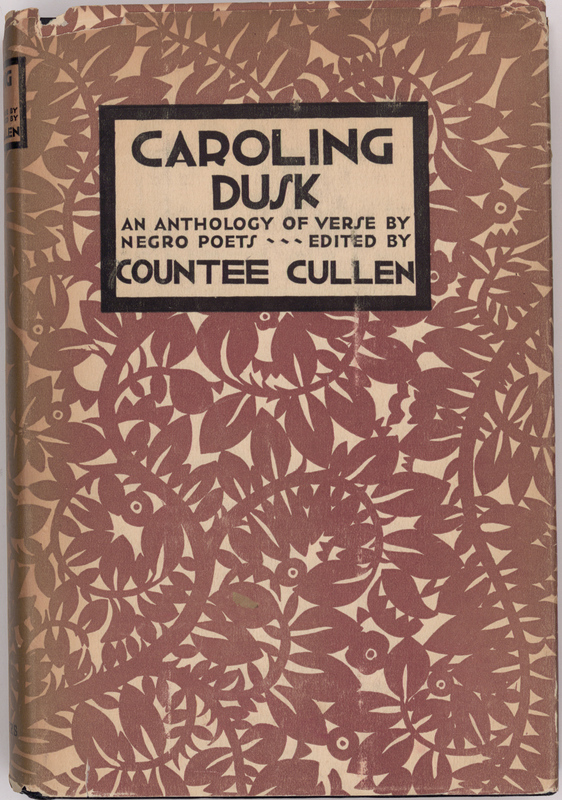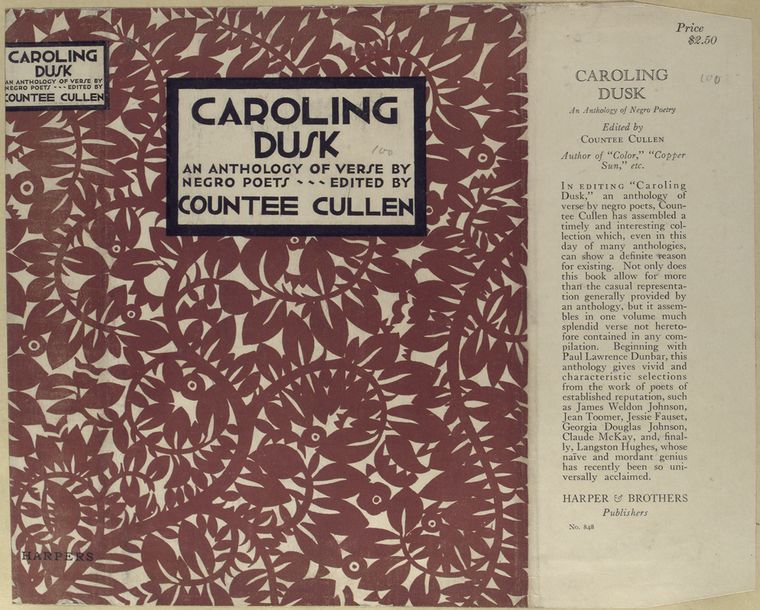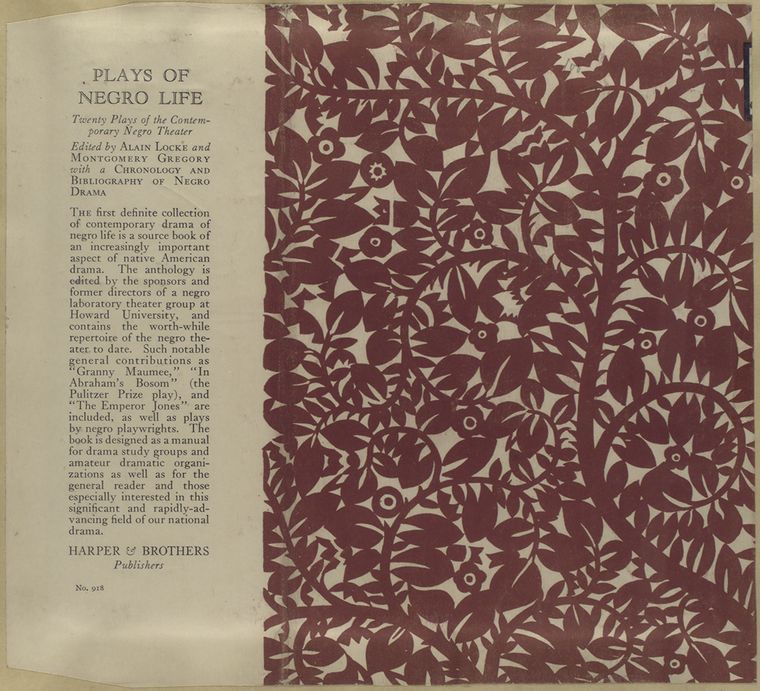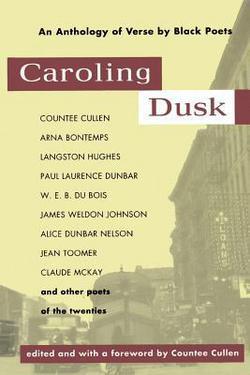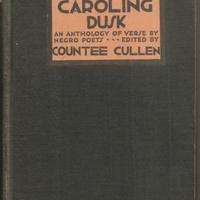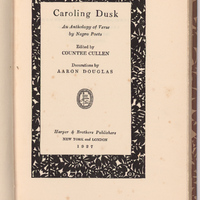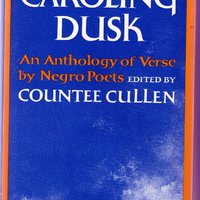-
Title
-
Caroling Dusk: An Anthology of Verse by Negro Poets
-
This edition
-
"Caroling Dusk: An Anthology of Verse by Negro Poets" . Ed. Countee Cullen. New York: Harper, 1927. xxii+237 pp.
-
Other editions, reprints, and translations
-
• Repr. New York: Harper & Row, 1974. xxii+237 pp.
• Repr. Kensington Publishing, 1998. xxii+237 pp.
-
Table of contents
-
[Countee Cullen] / Foreword (vii)
• Paul Laurence Dunbar / Ere Sleep Comes Down to Soothe the Weary Eyes (2)
• Paul Laurence Dunbar / Death Song (4)
• Paul Laurence Dunbar / Life (5)
• Paul Laurence Dunbar / After the Quarrel (5)
• Paul Laurence Dunbar / Ships That Pass in the Night (7)
• Paul Laurence Dunbar / We Wear the Mask (8)
• Paul Laurence Dunbar / Sympathy (8)
• Paul Laurence Dunbar / The Debt (9)
• Joseph S. Cotter, Sr. / The Tragedy of Pete (11)
• Joseph S. Cotter, Sr. / The Way-side Well (15)
• James Weldon Johnson / From the German of Uhland (17)
• James Weldon Johnson / The Glory of the Day Was in Her Face (18)
• James Weldon Johnson / The Creation (19)
• James Weldon Johnson / The White Witch (22)
• James Weldon Johnson / My City (25)
• William Edward Burghardt Du Bois / A Litany of Atlanta (26)
• William Stanley Braithwaite / Scintilla (31)
• William Stanley Braithwaite / Rye Bread (31)
• William Stanley Braithwaite / October XXIX, 1795 (32)
• William Stanley Braithwaite / Del Cascar (33)
• James Edward McCall / The New Negro (34)
• Angelina Weld Grimké / Hushed by the Hands of Sleep (36)
• Angelina Weld Grimké / Greenness (36)
• Angelina Weld Grimké / The Eyes of My Regret (37)
• Angelina Weld Grimké / Grass Fingers (38)
• Angelina Weld Grimké / Surrender (38)
• Angelina Weld Grimké / The Ways o' Men (39)
• Angelina Weld Grimké / Tenebris (40)
• Angelina Weld Grimké / When the Green Lies over the Earth
• Angelina Weld Grimké / A Mona Lisa (42)
• Angelina Weld Grimké / Paradox (43)
• Angelina Weld Grimké / Your Hands (44)
• Angelina Weld Grimké / I Weep (45)
• Angelina Weld Grimké / For the Candle Light (45)
• Angelina Weld Grimké / Dusk (46)
• Angelina Weld Grimké / The Puppet Player (46)
• Angelina Weld Grimké / A Winter Twilight (46)
• Anne Spencer / Neighbors (47)
• Anne Spencer / I Have a Friend (47)
• Anne Spencer / Substitution (48)
• Anne Spencer / Questing (48)
• Anne Spencer / Life-long, Poor Browning (49)
• Anne Spencer / Dunbar (50)
• Anne Spencer / Innocence (51)
• Anne Spencer / Creed (51)
• Anne Spencer / Lines to a Nasturtium (52)
• Anne Spencer / At the Carnival (53)
• Mary Effie Lee Newsome / Morning Light (55)
• Mary Effie Lee Newsome / Pansy (56)
• Mary Effie Lee Newsome / Sassafras Tea (56)
• Mary Effie Lee Newsome / Sky Pictures (57)
• Mary Effie Lee Newsome / The Quilt (58)
• Mary Effie Lee Newsome / The Baker's Boy (58)
• Mary Effie Lee Newsome / Wild Roses (59)
• Mary Effie Lee Newsome / Quoits (59)
• John Frederick Matheus / Requiem (61)
• Fenton Johnson / When I Die (62)
• Fenton Johnson / Puck Goes to Court (63)
• Fenton Johnson / The Marathon Runner (64)
• Jessie Fauset / Words! Words! (65)
• Jessie Fauset / Touché (66)
• Jessie Fauset / Noblesse Oblige (67)
• Jessie Fauset / La Vie C'est la Vie (69)
• Jessie Fauset / The Return (70)
• Jessie Fauset / Rencontre (70)
• Jessie Fauset / Fragment (70)
• Alice Dunbar Nelson / Snow in October (71)
• Alice Dunbar Nelson / Sonnet (72)
• Alice Dunbar Nelson / I Sit and Sew (73)
• Georgia Douglas Johnson / Service (75)
• Georgia Douglas Johnson / Hope (75)
• Georgia Douglas Johnson / The Suppliant (76)
• Georgia Douglas Johnson / Little Son (76)
• Georgia Douglas Johnson / Old Black Men (77)
• Georgia Douglas Johnson / Lethe (77)
• Georgia Douglas Johnson / Proving (77)
• Georgia Douglas Johnson / I Want to Die While You Love Me (78)
• Georgia Douglas Johnson / Recessional (79)
• Georgia Douglas Johnson / My Little Dreams (79)
• Georgia Douglas Johnson / What Need Have I for Memory? (80)
• Georgia Douglas Johnson / When I Am Dead (80)
• Georgia Douglas Johnson / The Dreams of the Dreamer (80)
• Georgia Douglas Johnson / The Heart of a Woman (81)
• Claude McKay / America (83)
• Claude McKay / Exhortation: Summer, 1919 (84)
• Claude McKay / Flame-heart (85)
• Claude McKay / The Wild Goat (87)
• Claude McKay / Russian Cathedral (87)
• Claude McKay / Desolate (88)
• Claude McKay / Absence (91)
• Claude McKay / My House (92)
• Jean Toomer / Reapers (94)
• Jean Toomer / Evening Song (94)
• Jean Toomer / Georgia Dusk (95)
• Jean Toomer / Song of the Son (96)
• Jean Toomer / Cotton Song (97)
• Jean Toomer / Face (98)
• Jean Toomer / November Cotton Flower (99)
• Joseph S. Cotter, Jr. / Rain Music (100)
• Joseph S. Cotter, Jr. / Supplication (101)
• Joseph S. Cotter, Jr. / An April Day (102)
• Joseph S. Cotter, Jr. / The Deserter (102)
• Joseph S. Cotter, Jr. / And What Shall You Say? (103)
• Joseph S. Cotter, Jr. / The Band of Gideon (103)
• Blanche Taylor Dickinson / The Walls of Jericho (106)
• Blanche Taylor Dickinson / Poem (107)
• Blanche Taylor Dickinson / Revelation (107)
• Blanche Taylor Dickinson / That Hill (109)
• Blanche Taylor Dickinson / To an Icicle (110)
• Blanche Taylor Dickinson / Four Walls (110)
• Frank Horne / On Seeing Two Brown Boys in a Catholic Church (112)
• Frank Horne / To a Persistent Phantom (113)
• Frank Horne / Letters Found Near a Suicide (114)
• Frank Horne / Nigger (120)
• Lewis Alexander / Negro Woman (122)
• Lewis Alexander / Africa (123)
• Lewis Alexander / Transformation (124)
• Lewis Alexander / The Dark Brother (124)
• Lewis Alexander / Tanka I-VIII (125)
• Lewis Alexander / Japanese Hokku (127)
• Lewis Alexander / Day and Night (129)
• Sterling A. Brown / Odyssey of Big Boy (130)
• Sterling A. Brown / Maumee Ruth (133)
• Sterling A. Brown / Long Gone (134)
• Sterling A. Brown / To a Certain Lady, in Her Garden (136)
• Sterling A. Brown / Salutamus (138)
• Sterling A. Brown / Challenge (138)
• Sterling A. Brown / Return (139)
• Clarissa Scott Delany / Joy (140)
• Clarissa Scott Delany / Solace (141)
• Clarissa Scott Delany / Interim (142)
• Clarissa Scott Delany / The Mask (143)
• Langston Hughes / I, Too (145)
• Langston Hughes / Prayer (146)
• Langston Hughes / Song for a Dark Girl (147)
• Langston Hughes / Homesick Blues (147)
• Langston Hughes / Fantasy in Purple (148)
• Langston Hughes / Dream Variation (149)
• Langston Hughes / The Negro Speaks of Rivers (149)
• Langston Hughes / Poem (150)
• Langston Hughes / Suicide's Note (151)
• Langston Hughes / Mother to Son (151)
• Langston Hughes / A House in Taos (152)
• Gwendolyn B. Bennett / Quatrains (155)
• Gwendolyn B. Bennett / Secret (155)
• Gwendolyn B. Bennett / Advice (156)
• Gwendolyn B. Bennett / To a Dark Girl (157)
• Gwendolyn B. Bennett / Your Songs (157)
• Gwendolyn B. Bennett / Fantasy (158)
• Gwendolyn B. Bennett / Lines Written at the Grave of Alexander Dumas (159)
• Gwendolyn B. Bennett / Hatred (160)
• Gwendolyn B. Bennett / Sonnet--1 (160)
• Gwendolyn B. Bennett / Sonnet--2 (161)
• Arna Bontemps / The Return (163)
• Arna Bontemps / A Black Man Talks of Reaping (165)
• Arna Bontemps / To a Young Girl Leaving the Hill Country (165)
• Arna Bontemps / Nocturne at Bethesda (166)
• Arna Bontemps / Length of Moon (168)
• Arna Bontemps / Lancelot (169)
• Arna Bontemps / Gethsemane (169)
• Arna Bontemps / A Tree Design (170)
• Arna Bontemps / Blight (170)
• Arna Bontemps / The Day-breakers (171)
• Arna Bontemps / Close Your Eyes! (171)
• Arna Bontemps / God Give to Men (172)
• Arna Bontemps / Homing (172)
• Arna Bontemps / Golgotha Is a Mountain (173)
• Albert Rice / The Black Madonna (177)
• Countee Cullen / Lines to Our Elders (179)
• Countee Cullen / I Have a Rendezvous with Life (180)
• Countee Cullen / Protest (181)
• Countee Cullen / Yet Do I Marvel (182)
• Countee Cullen / To Lovers of Earth: Fair Warning (182)
• Countee Cullen / From the Dark Tower (183)
• Countee Cullen / To John Keats, Poet, at Springtime (184)
• Countee Cullen / Four Epitaphs (186)
• Countee Cullen / Incident (187)
• Donald Jeffrey Hayes / Inscription (188)
• Donald Jeffrey Hayes / Auf Wiedersehen (189)
• Donald Jeffrey Hayes / Night (189)
• Donald Jeffrey Hayes / Confession (190)
• Donald Jeffrey Hayes / Nocturne (190)
• Donald Jeffrey Hayes / After All (191)
• Jonathan Henderson Brooks / The Resurrection (193)
• Jonathan Henderson Brooks / The Last Quarter Moon of the Dying Year (195)
• Jonathan Henderson Brooks / Paean (195)
• Gladys May Casely Hayford / Nativity (197)
• Gladys May Casely Hayford / Rainy Season Love Song (198)
• Gladys May Casely Hayford / The Serving Girl (200)
• Gladys May Casely Hayford / Baby Cobina (200)
• Lucy Ariel Williams / Northboun' (201)
• George Leonard Allen / To Melody (204)
• George Leonard Allen / Portrait (204)
• Richard Bruce / Shadow (206)
• Richard Bruce / Cavalier (207)
• Waring Cuney / The Death Bed (208)
• Waring Cuney / A Triviality (209)
• Waring Cuney / I Think I See Him There (210)
• Waring Cuney / Dust (210)
• Waring Cuney / No Images (212)
• Waring Cuney / The Radical (212)
• Waring Cuney / True Love (213)
• Edward S. Silvera / South Street (214)
• Edward S. Silvera / Jungle Taste (214)
• Helene Johnson / What Do I Care for Morning (216)
• Helene Johnson / Sonnet to a Negro in Harlem (217)
• Helene Johnson / Summer Matures (217)
• Helene Johnson / Poem (218)
• Helene Johnson / Fulfillment (219)
• Helene Johnson / The Road (221)
• Helene Johnson / Bottled (221)
• Helene Johnson / Magalu (223)
• Wesley Curtwright / The Close of Day (225)
• Lula Lowe Weeden / Me Alone (227)
• Lula Lowe Weeden / Have You Seen It (228)
• Lula Lowe Weeden / Robin Red Breast (228)
• Lula Lowe Weeden / The Stream (228)
• Lula Lowe Weeden / The Little Dandelion (229)
• Lula Lowe Weeden / Dance (229)
Index (230)
-
About the anthology
-
• Includes 219 poems by 38 poets, with individual selections ranging from one poem (W. E. B. Du Bois, James Edward McCall, John Frederick Matheus, Albert Rice, Lucy Ariel Williams, Wesley Curtwright) to 14 (Georgia Douglas Johnson and Arna Bontemps) or 16 poems (Angelina Weld Grimké).
-
Publisher's description
-
• "In editing 'Caroling Dusk,' an anthology of verse by negro poets, Countee Cullen has assembled a timely and interesting collection which, even in this day of many anthologies, can show a definitive reason for existing. Not only does this book allow for more than the casual appreciation generally provided by an anthology, but it assembles in one volume much splendid verse not heretofore contained in any compilation. Beginning with Paul Laurence Dunbar, this anthology gives vivid and characteristic selections from the work of poets of established reputation, such as James Weldon Johnson, Jean Toomer, Jessie Fauset, Georgia Douglas Johnson, Claude McKay, and, finally, Langston Hughes, whose naive and mordant genius has recently been so universally acclaimed" (jacket flap; transcribed from image above).
-
Anthology editor(s)' discourse
-
• In his foreword, Cullen notes the recent publication of James Weldon Johnson's "The Book of American Negro Poetry" (1922), Robert Kerlin's "Negro Poets and Their Poems" (1923), and Newman Ivey White & Walter Clinton Jackson's "An Anthology of Verse by American Negroes" (1924): "With Mr. Johnson's scholarly and painstaking survey, from both a historical and a critical standpoint, of the entire range of verse by American Negroes, and with Professor Kerlin's inclusions of excerpts from the work of most of those Negro poets whose poems were extant at the time of his compilation, there would be scant reason for the assembling and publication of another such collection were it not for the new voices that within the past three to five years have sung so significantly as to make imperative an anthology recording some snatches of their songs" (vii). Cullen's anthology, accordingly, is not a comprehensive historical anthology (as were the earlier anthologies he mentioned), but focuses instead on modern verse from Paul Laurence Dunbar to the present moment in 1927, including established poets who have published volumes of their verse and younger poets who have yet to collect their verse in book form (viii).
• "I have called this collection an anthology of verse by Negro poets rather than an anthology of Negro verse, since this latter designation would be more confusing than accurate. Negro poetry, it seems to me, in the sense that we speak of Russian, French, or Chinese poetry, must emanate from some country other than this in some language other than our own. Moreover, the attempt to corral the outbursts of the ebony muse into some definite mold to which all poetry by Negroes will conform seems altogether futile and aside from the facts. This country's Negro writers may here and there turn some singular facet toward the literary sun, but in the main, since theirs is also the heritage of the English language, their work will not present any serious aberration from the poetic tendencies of their times. The conservatives, the middlers, and the arch heretics will be found among them as among the white poets; and to say that the pulse beat of their verse shows generally such a fever, or the symptoms of such an ague, will prove on closer examination merely the moment's exaggeration of a physician anxious to establish a new literary ailment. As heretical as it may sound, there is the probability that Negro poets, dependent as they are on the English language, may have more to gain from the rich background of English and American poetry than from any nebulous atavistic yearnings toward an African inheritance" (ix).
• "Some of the poets herein represented will eventually find inclusion in any discriminatingly ordered anthology of American verse, and there will be no reason for giving such selections the needless distinction of a separate section marked Negro verse" (ix-x).
• "A survey of the work of Negro poets will show that the individual diversifying ego transcends the synthesizing hue" (x). "There are lights and shades of difference even in their methods of decrying race injustices, where these peculiar experiences of Negro life cannot be overlooked" (xi).
• "If dialect is missed in this collection, it is enough to state that the day of dialect as far as Negro poets are concerned is in the decline. Added to the fact that these poets are out of contact with this fast-dying medium, certain sociological considerations and the natural limitations of dialect for poetic expression militate against its use even as a 'tour de force'. In a day when artificiality is so vigorously condemned, the Negro poet would be foolish indeed to turn to dialect. The majority of present-day poems in dialect are the efforts of white poets" (xii).
• "This anthology, by no means offered as 'the' anthology of verse by Negro poets, is but a prelude, we hope, to that fuller symphony which Negro poets will in time contribute to the national literature, and we shall be sadly disappointed if the next few years do not find this collection entirely outmoded" (xii).
• "The biographical notices carried with these poems have been written by the poets themselves save in three cases (Dunbar's having been written by his wife, the younger Cotter's by his father, and Lula Weeden's by her mother), and if they do not reveal to a curious public all it might wish to know about the poets, they at least reveal all that the poets deem necessary and discreet for the public to know" (xii).
-
Reviews and notices of anthology
-
• Bruce, Richard. "The Dark Tower." "Opportunity" 5 (Oct. 1927): 305. [Google Books]:
"I have just looked over the proofs of 'Caroling Dusk,' an anthology of verse by Negro poets, edited by Countee Cullen. It is going to be a beautiful book with a jacket by aaron Douglas. Nearly all the Negro poets are represented: Langston Hughes, Georgia Douglas Johnson, Arna Bontemps, Angelina Grimké, Claude McKay, Paul Laurence Dunbar, Alice Dunbar Nelson and W. E. B. Du Bois being among the best known. Albert Rice is represented by a few very lovely things. Mr. Rice is new to most of us. A very interesting feature is introduced in the autobiographical sketches. Each artist has written his own except in three instances, in two of which the poet is dead and in the third too young. I shall get the first copy off the press" (full notice).
-
Google Books
-
• Benet, Laura. "New York Evening Post" 3 Dec. 1927: 15.
• Park, Robert. "American Journal of Sociology" (date?).
• Zabel, Morton D. "Poetry" (May 1928).
-
• Parnell, Idella. Review of "Caroling Dusk." "Opportunity" 5 (December 1927): 374-75. [Google Books]:
"With the unhappy heritage of poverty, prejudice, and contempt to combat, and with the happy heritage of ambitious minds, singing hearts, and a simple faith in ultimate goodness and justice, these carolers have the conflict and impetus necessary for the production of art" (374).
"In an age that is growing altogether too self-conscious, poetry is suffering from over-intellectualization. In proportion as it grows cerebral it grows sterile and unsatisfactory. We ask our poets for the bread of life, and most of them give us the uncomforting stone of cold mentality. Poetry is losing simplicity, intuition, emotional color, and human values which, in the past, have made it a consolation and a revelation to man" (375). But in work by Negro poets there is a happy balance between feeling and thought: "In 'Caroling Dusk' we mind immediate responses to the beauty seen by the singers; responses colorful and glowing with a real abundance of life. These are fashioned into simple and sincere songs. We find here a wide range of human emotion--pathos, pity, irony, pride, hate, love and humor. Moreover, among most of these poets there is sufficient depth of thought and intellectual quality to give weight and meaning to their verse. Happily, the Negro has not yet learned to divorce heart and mind, and cleave to mind alone; he can therefore write a complete poem, born in pain out of his completeness of being" (375). [There seems to be a glance here at T. S. Eliot's notion of the dissociation of sensibility (in his essay on "The Metaphysical Poets," "TLS" 20 Oct. 1921).] Cf. the subsequent remark: "We wish Jean Toomer would strive more to be the poet, and less the articulate Negro" (375).
Parnell reserves her highest praise for Sterling Brown and Countee Cullen: "Sterling A. Brown, in 'Salutamus' and 'Challenge,' strikes a resounding note; then turning to the ballad he shows us in 'Maumee Ruth,' the 'Odyssey of Big Boy,' and the thoroughly enjoyable 'Long Gone,' his mastery of a lighter form and of tragedy in a comic mask. Langston Hughes will have to look to his laurels" (375). "There is no doubt that the poems by Countee Cullen constitute the finest group in the anthology; 'To Lovers of Earth: Fair Warning' reaches as high a level as any short poem we have seen this year. If Countee Cullen continues writing with the maturity shown in his poems of the present year, he will be one of the great poets of America" (375).
-
Google Books
-
Commentary on anthology
-
• 1947: "this compilation sought to break with the racial tradition in poetry and, presumably, in other forms of expression. Cullen's preface is explicit on this point, since he rightly feared the limitations of a purely ethnocentric literary tradition. He sought in "Caroling Dusk" to present a selection of poems which might have been written by any group of talented authors, but which happened to come from the pens of Negro writers. In his own poetry Cullen had attempted to broaden both the scope and the appeal of verse by a Negro hand. It is ironic that Saunders Redding, choosing a title for his literary criticism from Cullen's poetry ("To Make a Poet Black"), should condemn the poet for his effort to write in a larger, more universal vein than a racial tradition. Indeed, a portion of the power and poignancy of Cullen's couplet must have stemmed from his own despair when he surveyed a racial tradition in literature which demanded, above all else, conformity to a theme. Cullen was not alone in his protest against the limitations of The Dark Tower" (John S. Lash. "The Anthologist and the Negro Author." "Phylon" 8.1 [1947]: 68-76, at 73).
-
• 1950: "Five years after James Weldon Johnson's anthology, "The Book of American Negro Poetry", was released, Cullen collected a group of Negro poems which he published under the title of "Caroling Dusk" (1927). The main purpose of this book was to focus attention of the reading public on the younger poets who, since the earlier ones, were making significant contributions to American literature. Some writers from which ["sic"] little had been heard prior to this anthology were: Helen Johnson, Jonathan Brooks, and Gladys M. C. Hayford. Not much has been heard from some of these people since this time either. Frankly, in this book, Cullen gave a great deal of space to undeserving poetry, a fact which seems to be common knowledge [see Laura Benet, "New York Evening Post" 3 Dec. 1927: 15]. A number of these poets have been completely forgotten, and well they may be" (Robert A. Smith. "The Poetry of Countee Cullen." "Phylon" 11.3 (1950): 216-21, at 219).
-
• "An early effort to pay tribute to black poets, this collection was strongest in its focus on many younger poets who have since become basic to American poetry and culture. But it also included some fairly poor choices, particularly one Albert Rice. But this came from the daring spirit of the compiler who wanted to represent not only well-known writers, but also relative beginners. Cullen published several volumes of his own work in the 1920's and 1930's that apparently suffered from many of the same artistic faults as his choices in this collection. This is more of // historical/literary interest than a good place to turn for representative black poets. It is a more useful reference work for libraries, but not of real value to general readers today" ("The Columbia Granger's Guide to Poetry Anthologies". Ed. William Katz, Linda Sternberg Katz, and Esther Crain. 2nd enlarged ed. New York: Columbia UP, 1994. 7-8).
-
• Focuses on more recent poets, "especially those associated with the Harlem Renaissance," such as Jessie Fauset, Claude McKay, Jean Toomer, Sterling Brown, Langston Hughes, Gwendolyn Bennett, Arna Bontemps, Helene Johnson, and Cullen himself (Kinnamon 1997: 469). "A special feature of this anthology is headnotes by the poets themselves (with three exceptions). Dialect poetry is mostly absent, fulfilling Johnson's prophecy [in "The Book of American Negro Poetry "(1922)] and Cullen's own distinct preference" (Kinnamon 1997: 469).
-
• Sigler, Danielle. "Caroling Dusk, An Anthology of Verse by Negro Poets." "Ransom Center Magazine"] 23 Feb. 2016. Harry Ransom Center, U of Texas at Austin. Web : In a letter of 4 Nov. 1926, Countee Cullen writes to Idella Purnell, the editor of "Palms" magazine: "The Negro Poets' issue of PALMS has met with such a fine reception that I am going to undertake the editing of an anthology of Negro verse which Harper's has promised to publish for me. I shall probably want to use all the material which appeared in PALMS, of course, with due acknowledgement. May I know whether there is any objection to this?" As Sigler notes, "Cullen reprinted six poems from "Palms" in "Caroling Dusk"": ""Caroling Dusk" provided Cullen with the opportunity to reaffirm the philosophy of race and poetry that Langston Hughes had so publicly critiqued in 'The Negro Artist and the Racial Mountain.' In the biographical notice prefacing his own poetry Cullen writes of himself:
He has said, perhaps with a reiteration sickening to some of his friends, that he wishes any merit that may be in his work to flow from it solely as the expression of a poet—with no racial consideration to bolster it up. He is still of the same thought.
"Even the anthology's carefully selected subtitle reflects this approach. In contrast to previous anthologies that contained "Negro poetry," Cullen created an "anthology of verse by Negro poets." He addresses this important difference in his introduction: "the attempt to corral the outbursts of the ebony muse into some definite mold into which all poetry by Negroes will conform seems altogether futile and aside from the facts." In Caroling Dusk, Cullen sought to showcase the "lights and shades of difference" in poetry by "Negro" writers, and he intentionally omitted dialect poems as a genre in "decline.""
-
Ransom Center Magazine
-
See also
-
• Cullen was a proponent of a non-racial conception of literature by African American authors, as he had indicated in print before the publication of this anthology: e.g. "If I am going to be a poet at all, I am going to be POET and not NEGRO POET. This is what has hindered the development of artists among us. Their one note has been the concern with their race. That is all very well, none of us can get away from it. I cannot at times. You will see it in my verse. The consciousness of this is too poignant at times. I cannot escape it. But what I mean is this: I shall not write of negro subjects for the purpose of propaganda. That is not what a poet is concerned with. Of course, when the emotion rising out of the fact that I am a negro is strong, I express it. But that is another matter" (Countee Cullen in "Brooklyn Eagle" February 10, 1924) (from AALBC.com website https://aalbc.com/authors/author.php?author_name=Countee+Cullen )
-
Cited in
-
• Lash 1946: 723.
• Kinnamon 1997: 469.
• Indexed in "The Columbia Granger's Index to African-American Poetry" (1999)
-
Item Number
-
A0021
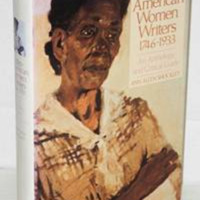 Afro-American Women Writers, 1746-1933: An Anthology and Critical Guide
Afro-American Women Writers, 1746-1933: An Anthology and Critical Guide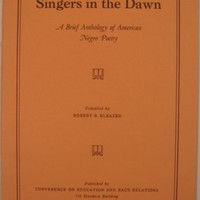 Singers in the Dawn: A Brief Supplement to the Study of American Literature; repr. as Singers in the Dawn: A Brief Anthology of Negro Poetry
Singers in the Dawn: A Brief Supplement to the Study of American Literature; repr. as Singers in the Dawn: A Brief Anthology of Negro Poetry